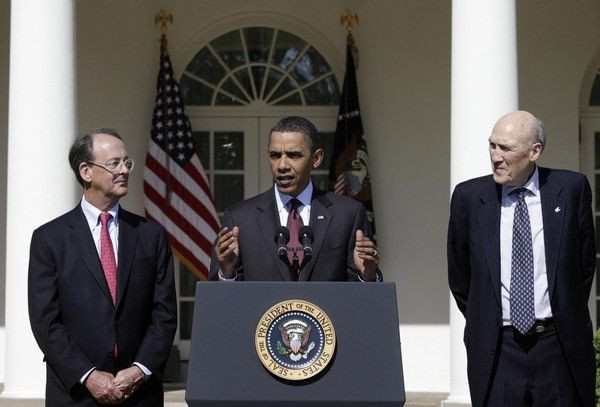Debt reduction plan filled with tough choices

Former Sen. Alan Simpson, R-WY, has a reputation of being frank to the point of being blunt. He did not disappoint today, when expressing what he called the main message from the National Commission on Fiscal Responsibility and Reform.
America, you have a serious problem and time is short to address it, Simpson said.
The commission, also known as the Presidential Debt Commission, is a bipartisan, 18-member panel created by President Obama in February and charged with finding bipartisan solutions to cut and eliminate the nation's $13.8 trillion budget deficit.
The commission is co-chaired by Simpson and Erskine Bowles, former chief of staff for President Clinton
The commission is scheduled to make its final recommendations tomorrow. It had planned to hold open public meetings today and tomorrow, leading up to the presentation of the report. But the panel decided on Monday to proceed with closed-door discussions instead.
We will make our deadline and present our report on December 1, Simpson said, and he added that critics from the right and the left will likely rip the report to shreds.
Bowles said that while the report will be made public tomorrow, the commissioners will have until Friday to vote on the recommendations, so that they can have time to properly read and review the report.
At least 14 of the 18 commission members must approve the recommendations for the proposal to merit action from Congress.
Bowles said he is hopeful that 14 members will approve the recommendations, although he did not know how many votes the proposal will get.
But the recommendations would lay a foundation for the deficit debate in the next Congress, even if the commission does not approve them, Bowles said.
Our goal is pretty simple -- to start a sane conversation on the dangers of the debt, Bowles said. This is about making tough, difficult choices.
Bowles called the national deficit a cancer, destroying our nation from within.
The recommendations, previewed in a report by the co-chairs on Nov. 10, would seek $4 trillion in deficit reduction over the next decade by cutting discretionary spending and eliminating tax breaks, while also raising the Social Security retirement age and imposing other changes on entitlement benefits.
According to the co-chairs' report, over $1.4 trillion of the savings would come from discretionary spending, over $700 billion from mandatory spending, over $700 billion from tax reforms, and over $600 billion from paying less interest on debt.
Under this proposal, in 2020, the budget deficit is projected to be to just $382 billion, or 1.6 percent of the projected 2020 GDP. By 2037, the budget would be balanced and then turned into surpluses in subsequent years.
The spending cuts would start gradually in 2012 in order to not disturb the fragile economic recovery, the commission said.
The proposal has met with criticism from both ends of the political spectrum, with liberals in general opposing interference with entitlement programs like Social Security and conservatives objecting to eliminating tax breaks.
AFL-CIO President Richard Trumka ripped the co-chairs' report earlier this month.
The chairmen of the Deficit Commission just told working Americans to 'Drop Dead,' Trumka said. Especially in these tough economic times, it is unconscionable to be proposing cuts to the critical economic lifelines for working people, Social Security and Medicare. Some people are saying this is plan is just a 'starting point.' Let me be clear, it is not.
But Maya MacGuineas, president of the Committee for a Responsible Federal Budget, called the propsal most encouraging.
It is truly a remarkable plan, MacGuineas said. This plan does it all - allows time for the economy to strengthen, brings down future deficits and debt, protects the most disadvantaged, makes government more effective and efficient, and promotes economic growth and competiveness.
The CRFB put out another release today, urging commission members to work together to support the plan.
No plan will ever be perfect in everyone's eyes, MacGuineas said. In fact, given the magnitude of the task, in all likelihood, no plan will be perfect in anyone's eyes. Any plan that realistically gets the national debt back down to a manageable level will be filled with things we all hate - that is the unfortunate nature of deficit reduction.
She said the plan needs to be aggressive enough to put the budget on a path that is sustainable.
Watering down what Co-Chairs Erskine Bowles and Alan Simpson proposed in order to get more support will not do the country any favors, MacGuineas said.
The members of the Fiscal Commission have the critical task of leading the nation in a discussion about how to fix our budget challenges before credit markets turn against us and force more painful actions. Supporting a plan need not mean that a member supports every aspect of it, but rather that they understand that real leadership will require compromise, she said.
Bowles also warned that if sound, decisive actions are not taken, and soon, the U.S. may find itself in a position similar to the devastated economies of Greece, Ireland and Spain, and will have to suffer severe economic austerity to simply survive.
© Copyright IBTimes 2024. All rights reserved.





















